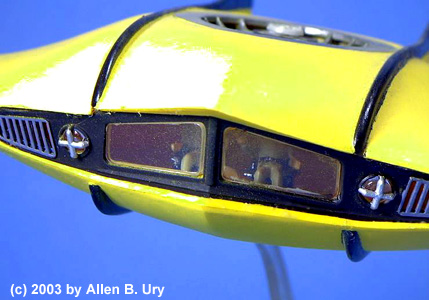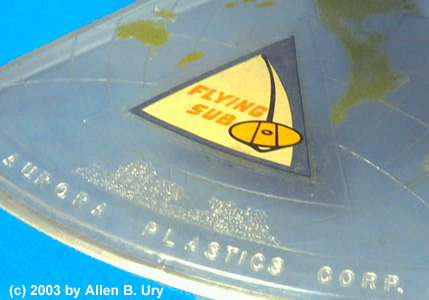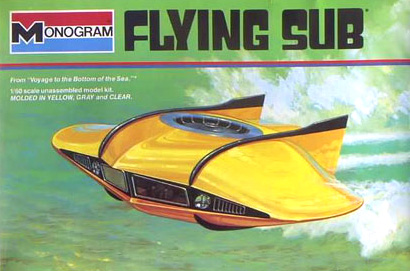|
|
Flying Sub from |
"Voyage to the Bottom of the Sea" |
(ABC-TV - 1964-69) |
|
|
|
|
SCALE: 1/48 |
|
|
INITIAL RELEASE: 1966 |
|
|
MEDIUM: Polystyrene |
|
|
RARITY: (2) |
|
|
 |
|
|
|
 |
|
ABOUT THE DESIGN |
ABOUT THE KIT |
|
Introduced in "Voyage to the Bottom of the Sea's" full-color second season (1965-1966), the Flying Sub represents the beginning of the show's slow but steady decline from imaginative but otherwise realistic action-adventure to pure fantastic hokum. Taking its lines from ray-fish, the vehicle launched from a berth beneath its mothership, the SSRN "Seaview," and could move at high speeds underwater, or at even higher speeds by taking to the air. Inevitably, the craft would be shown nose-diving back into the ocean -- a maneuver that must have knocked the freakin' wind out of the poor pilot and passengers who had to endure such a watery impact. The Flying Sub's elegantly curved lines and pointy nose heavily influenced the design of the Spindrift spacecraft featured in Irwin Allen's final sci-fi fantasy TV series, "Land of the Giants" (1968-1970.) The craft also appeared in Allen's 1969 pilot-turned-made-for-TV-movie "City Beneath the Sea," redubbed the "Aquafoil." Odd Design Feature: Although the Flying Sub front end featured two intakes for air and water, its rear-mounted jet engines were provided with no access to these essential mediums. In fact, in both the studio set and this model kit, the jet engines simply sit in the middle of their own compartment. This immediately begs the question: Where did they get the media necessary to produce thrust? |
Released by Aurora Models in 1966, the Flying Sub kit featured a removable top panel that exposed a complete interior -- including those two awkwardly situated jet engines. However, like many of Aurora's vehicle kits, the model was not particularly well engineered and, if the interior was built as instructed, the top panel never quite sat right. For appearance's sake, this kit was built with only the forward pilots' seats in place behind the forward windshield, but with no other interior features present. Aurora briefly re-released this kit with new box art shortly before going out of business in the mid-1970s. This same box art was subsequently used for a brief 1979 re-release by Monogram, for an even briefer 1990 re-re-release by Japan's Tsukuda company under the moniker "OLD TIME S.F." (What was this? "Flash Gordon"?), then again for another Monogram re-re-re-release in the mid-1990s. The Monogram kit has been regularly available ever since. (Whew!) Believe it or not, this is a copy of the original Aurora kit. |
|
|
|
Original Box Art |
|
|
 |
|
Tsukuda Box Art |
Monogram Re-Release Box Art |
|
Pop Culture |
Home X-Planes Concept Aircraft Spacecraft & Missiles Concept Spacecraft Science Fiction Grab Bag